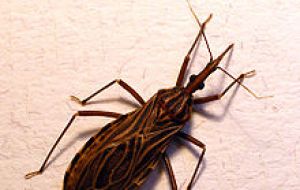MercoPress. South Atlantic News Agency
Outbreak of Tropical Parasite Disease Threatens Metropolitan Caracas
 Chipo or kissing bug, the principal vector
Chipo or kissing bug, the principal vector Venezuelan Health and Social Protection Minister Luis Reyes confirmed 15 cases of Chagas disease in the capital Caracas, following an outbreak in the popular quarters of the city. However Minister Reyes flatly discarded the word “epidemics”.
Health Ministry Epidemiology Director, Miriam Morales said 18 people had been under observation and blood samples of 15 had been found positive. All the people live in the same area where the outbreak was discovered.
At the moment, four children are interned in Miguel Pérez Carreno Hospital. Morales maintained that those suspected of Chagas disease will undergo three additional tests before a final diagnosis is announced. The death of a baby in the same neighbourhood two weeks ago is the subject of an investigation, even though Morales is of the opinion that the death is not related to Chagas.
Ministry Environmental Health Department officials have been visiting the area where the outbreak occurred and reported that the zone is hilly and semi-urban, but have found no other persons with the symptoms. Officials are combining the campaign to root out the bugs that cause Chagas with anti-dengue campaigns since both carriers—the chipo bug and mosquitoes—thrive in garbage and moist areas of houses.
The Pan American Health Organization (PAHO) estimates that 1,500 new cases of the illness are recorded in Venezuela each year and a total 769 people die of the disease every year. Some people carry the parasite called Trypanosoma cruzi that causes Chagas disease without developing symptoms.
PAHO in its quantitative estimate of Chagas disease in the Americas, updated as of 2005, estimated that carriers of the disease with visible symptoms amount to 350,000 people in Venezuela. The insect that spreads the Chagas disease, the chipo—Rhodnius prolixus or “kissing bug”—is the main mode of transmission, said Ana Carvajal, of the Network of Scientific Societies in Venezuela.
Experts believe that 101,488 square kilometres of the Venezuelan territory, including 198 municipalities, are a common habitat for chipo. Although the insect can be found in the Capital District and 22 Venezuelan states, the states with most diagnosed cases are Trujillo, Lara, Portuguesa and Barinas, due to their geographical location at foot of hills, near coffee plantations and houses made of mud and straw that facilitate the survival of the vector.
However, in less than two and a half years, the metropolitan area of Caracas has been affected by three massive outbreaks. A fruit juice was the contamination factor both in the municipality of Chacao and in the town of Chichiriviche de la Costa.
The symptoms of Chagas disease vary over the course of an infection. In the early, acute stage, symptoms are mild and usually produce no more than local swelling at the site of infection. After 4-8 weeks, infected individuals enter the chronic phase of Chagas disease that is asymptomatic for 60-80% of individuals.
The initial acute phase is responsive to antiparasitic treatments, with 60-90% cure rates. These antiparasitic treatments also appear to delay or prevent the development of disease symptoms during the chronic phase of the disease, but 20-50% of infected individuals will eventually develop life-threatening heart and digestive system disorders.
The currently available antiparasitic treatments for Chagas disease are benznidazole and nifurtimox, which can cause temporary side effects in many patients including skin disorders, brain toxicity, and digestive system irritation. Together with malaria and squistosomiaisis, Chagas is among the top three most common parasite infection diseases and is closely associated to different illness related to the heart.
The disease takes the name of the Brazilian scientist who discovered the parasite and the infecting insect, Dr. Carlos Chagas.




Top Comments
Disclaimer & comment rules-

Read all commentsNasty stuff but what a fantastically written article. Bravo !
May 14th, 2010 - 09:35 am 0Commenting for this story is now closed.
If you have a Facebook account, become a fan and comment on our Facebook Page!